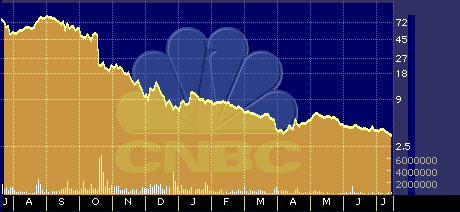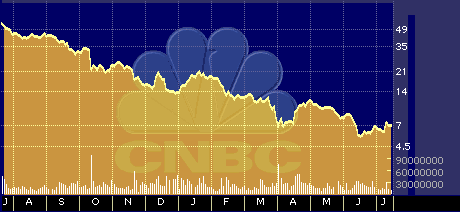
Netro Soars on Broadband-Wireless Hopes
Netro Soars on Broadband-Wireless Hopes
by Hal Plotkin
Silicon Valley Correspondent
Netro Corp.’s {NTRO} stock price has soared since its recent IPO, reflecting hopes that the company’s alliance with Lucent Technologies Inc. {LU} will make it a dominant player in the rapidly growing broadband-wireless market.
“They have excellent technology, and there’s going to be a huge global market for their products,” says Hongjun Li, director of research at Parks Associates, a telecommunications market-research firm based in New York.
San Jose, Calif.-based Netro sells broadband-wireless access systems to telecom providers, such as telephone companies and Internet service providers. The company went public on Aug. 19 at $8 a share.
The stock skyrocketed on the first day of trading, up 84 percent, hitting $14.75. More recently, Netro shares have been changing hands at more than three times that price.

NTRO stock performance since its recent IPO
Industry analysts say Netro is the company to watch in an industry that’s poised to explode over the next few years.
Overall, the market for broadband-wireless equipment is expected to grow at an annual compound rate of 26.6 percent, from $330 million last year to more than $3.73 billion by 2005, according to Frost & Sullivan, a market-research firm based in Menlo Park, Calif.
“The market is still in its embryonic stages,” says Greg Naderi, an information-technology analyst at Frost &Sullivan. “But the overall industry sentiment is that our estimates may even be a little on the conservative side.”
Netro’s popularity with analysts stems from strong demand for wireless broadband, or high-speed telecom services.
The company’s technology allows an ISP or telecom company to bypass local telephone companies and bring inexpensive high-speed telecom services, including voice and Internet access, directly to consumers.
“We believe that broadband data technologies represent the next major growth opportunity for the wireless industry,” Eric C. Zimits, an analyst at Hambrecht & Quist, based in San Francisco, wrote in a recent report.
Earlier this year, Lucent, based in Murray Hill, N.J., said it would bundle Netro’s main product, AirStar, into Lucent’s OnDemand family of wireless broadband systems.
The new product allows consumers with line-of-site access to a wireless transmitting base station, which could eventually be as much as 60 percent of all U.S. telecommunications users, to receive wireless Internet access at speeds as high as 45 megabits per second, nearly 1,000 times faster than 56kbps computer modems.

LU 52-week stock price chart
Netro’s product also automatically and immediately divides bandwidth based on a dynamic assessment of user needs. As a result, telecom-service providers can deliver the bandwidth customers need when they need it.
“They don’t waste any resources creating bandwidth streams that aren’t always in use,” Li says. “That’s a very important feature. It’s much more efficient.”
Naderi says Netro enjoys a substantial cost advantage over comparable hard-wired broadband technologies because the incremental costs to add a new customer are much lower.
“That means the overall price for users is going to be much less than for other systems,” Naderi says. He expects Netro to announce at least one major new deal with a telecom provider or major ISP within the next few days or weeks.
Netro’s most-telling advantage, though, may be the fact that wireless networks using the company’s technology can be deployed much faster than hard-wired systems can be built.
“There’s no way companies depending on hard-wired technologies [such as cable-TV firms or traditional telephone companies] can compete with that rapid installation pace,” Naderi says.
As a result, Netro’s opportunities outside the United States may be even more substantial, Li says.
“Take a place like China,” Li adds. “Many areas there don’t even have telecommunications services yet. They are going to go for the least expensive technology when they build new systems. I think [Netro’s technology] will be very strong, very welcome, in China.”
The company faces competition from several large telecom and networking firms, including Nortel Networks Corp. {NT}, Ericsson {ERICY}, and a venture between Cisco Systems Inc. {CSCO} and Motorola Inc. {MOT}, all of which have been making substantial investments recently in broadband-wireless technology.
” That’s why the alliance with Lucent is so important,” Li says. Companies such as Cisco and Motorola are relatively new entrants in the wireless broadband field, he says, while “Netro is the more established player.”
Netro posted a loss of $14.3 million on revenue of $5.3 million for the six months ended June 30.
Check out Netro Corp.’s Web site (editor’s update: company acquired by SR Telecom in 2003)


